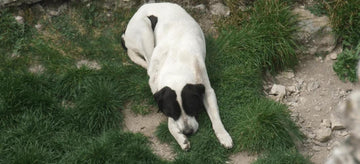From Biscuits to Boulders: Why Do Dogs Eat Rocks and What You Can Do About It
by Jamie Tedder on Jul 18, 2023

Welcoming a furry friend into your life brings joy and laughter, but it also means encountering some perplexing behaviors. While tail-chasing and barking at reflections are typical dog antics, ingesting rocks is particularly unusual and potentially dangerous. Far from being a mere quirk, this behavior may indicate underlying health or psychological issues that require immediate attention. So, why do dogs eat rocks, and what can you do to protect your canine companion from harm? This article will delve into the reasons behind this behavior and explore effective strategies to address and prevent it.
Understanding Pica in Dogs
The term for a dog's craving and consumption of non-food items, including rocks, is "pica." Pica is not unique to dogs; it can occur in other animals and even humans. In most cases, pica is considered a symptom rather than a standalone disorder, often indicating underlying medical or behavioral problems.
Possible Causes for Pica in Dogs
Several factors can contribute to a dog's inclination to eat rocks:
1. Nutritional Deficiencies: Some dogs may eat rocks to supplement missing nutrients in their diet. If their regular food fails to provide essential minerals or fiber, dogs may seek these elements elsewhere, including inedible objects like rocks. However, it's important to note that nutritional deficiencies are not the sole cause of rock-eating, as many dogs with balanced diets still exhibit this behavior.
2. Boredom or Anxiety: Dogs that lack mental and physical stimulation may develop various problematic behaviors, including pica. Boredom or anxiety can drive dogs to engage in alternative activities to alleviate their restlessness or stress, such as consuming rocks. Ensuring your dog receives adequate exercise, mental stimulation, and social interaction can help address this underlying cause.
3. Medical Issues: Certain conditions, such as neurological disorders, liver disease, or gastrointestinal problems, can increase a dog's likelihood of developing pica. These conditions can affect a dog's appetite or lead to abnormal cravings, prompting them to ingest rocks. If you suspect an underlying medical issue, it is crucial to consult with your veterinarian for a proper diagnosis and treatment plan.
The Dangers of Dogs Eating Rocks
Eating rocks poses significant risks to a dog's health. Rocks can cause oral injuries, including dental fractures and lacerations to the gums. However, the most severe danger associated with rock consumption is gastrointestinal obstruction. When a dog ingests a rock, it can become lodged in the digestive tract, obstructing the passage of food and fluids. This condition is a medical emergency that requires immediate veterinary attention. Symptoms of gastrointestinal obstruction may include vomiting, loss of appetite, lethargy, abdominal pain, and a change in bowel movements. If you suspect your dog has ingested a rock and exhibits these signs, it is crucial to seek veterinary care promptly.
Preventing and Managing Rock-Eating Behavior
1. Ensure a Balanced Diet: Providing your dog with a nutritionally balanced diet is vital for their overall health and well-being. Please consult your veterinarian or a pet nutritionist to ensure your dog's food meets all their nutritional requirements. A well-balanced diet can help address potential nutritional deficiencies contributing to rock-eating behavior.
2. Environmental Enrichment and Exercise: Boredom and anxiety are common underlying causes of pica. Ensure your dog receives regular mental and physical stimulation to prevent these issues. Engage them in interactive play, provide puzzle toys, and establish a consistent exercise routine. Mental and physical activities help divert their attention away from destructive behaviors like eating rocks.
3. Training and Behavior Modification: Teaching your dog basic commands like "leave it" or "drop it" can be invaluable in redirecting their attention and preventing them from picking up and consuming rocks. Positive reinforcement techniques can help reinforce desired behaviors and discourage unwanted ones. Seek guidance from a professional dog trainer if needed.
4. Supervision: Keeping a close eye on your dog, especially in environments where rocks are present, is essential. If you notice them showing interest in rocks, redirect their attention to appropriate toys or activities. By closely supervising your dog, you can intervene and prevent them from engaging in rock-eating behavior.
5. Veterinary Check-Ups: Regular veterinary check-ups are crucial for monitoring your dog's health. During these visits, discuss any concerns regarding pica or other behavioral issues with your veterinarian. They can perform necessary tests to rule out any underlying medical conditions contributing to the behavior.
Gotta Go Grass: An Alternative Solution
Providing an appropriate place to relieve themselves or explore can be beneficial for dogs who spend a significant amount of time indoors or have limited access to grassy areas. One such solution is Gotta Go Grass, a natural dog grass patch. Gotta Go Grass offers a comfortable and enticing area for dogs to relax, play, and relieve themselves. This product features natural grass that absorbs liquids and controls odors, providing a non-toxic and pet-friendly space. Offering a dedicated area with natural grass makes dogs less likely to be tempted by rocks or other undesirable items in their environment.

Preventing Rock-Eating Behavior in Dogs
Understanding why dogs eat rocks is crucial for the well-being of our furry companions. By addressing the underlying causes, such as nutritional deficiencies, boredom, anxiety, or medical issues, we can take appropriate measures to prevent and manage this behavior. Providing a balanced diet, enriching their environment, implementing training and supervision, and seeking veterinary care are all essential steps in addressing rock-eating behavior. Alternative solutions like Gotta Go Grass can offer a safe and appealing space for dogs to explore and eliminate, reducing the temptation to consume rocks. We can help our dogs lead healthy, rock-free lives with proper attention, care, and prevention strategies.




